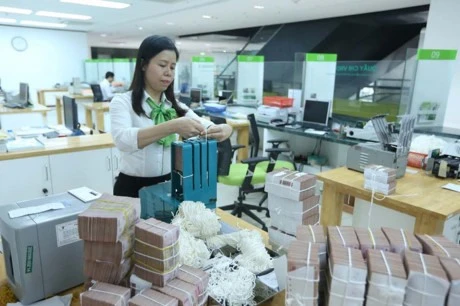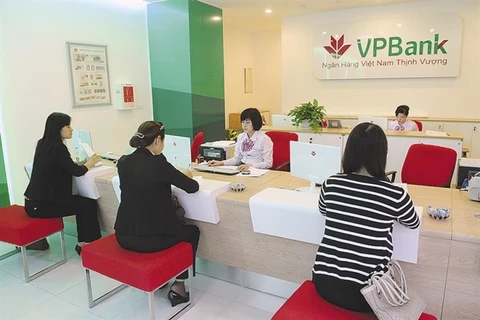 The Government’s recent decision on the restructuring of credit institutions ensures that State-owned banks listed on the market no longer have to worry about dividend payout in cash. (Photo: vietnambiz.vn)
The Government’s recent decision on the restructuring of credit institutions ensures that State-owned banks listed on the market no longer have to worry about dividend payout in cash. (Photo: vietnambiz.vn) Hanoi (VNA) - The Government’s recent decision on the restructuring of credit institutions ensures that State-owned banks listed on the market no longer have to worry about dividend payout in cash, experts said.
Under Decision 1058/QD-TTg issued last week, the Government required the Ministry of Finance, in conjunction with the State Bank of Vietnam and the Ministry of Planning and Investment, to help State-owned banks increase their chartered capital in the 2016-20 period so that the banks can meet Basel II capital standards by 2020.
Vietcombank, Vietinbank and BIDV are the three listed banks in which the State holds more than 50 percent of the chartered capital. Currently, the banks do not meet the minimum Basel II requirement of 8 percent for capital adequacy.
However, the three banks have failed to increase their chartered capital despite repeated efforts over the past few years. Raising their capital was tough for these banks as they could not use their profits for the purpose; profits would go for cash dividend payout, as required by the Ministry of Finance.
Last year, though at the annual general meetings (AGM) of Vietinbank and BIDV, dividend payout in shares was approved so that money could be used for capital increase, the Ministry of Finance insisted that the banks pay dividend in cash.
The banks had no choice but to follow the ministry’s orders, which helped the State budget earn a revenue of around 4 trillion VND (175.4 million USD).
If this continues, as per a proposal circulated during the AGM season in April, the three banks will contribute a total of 6 trillion VND to the State budget through dividend payout in cash in 2017.
However, because of the Government’s new regulations, banking expert Phan Minh Ngoc said the Ministry of Finance would not insist on cash dividend payout for the next few years. Of course, the banks could choose to pay dividends in cash if they make profits higher than the approved chartered capital increase.
According to the National Assembly resolution on the 2016-20 economic restructuring plan, commercial banks will have equity capital under Basel II standards, in which at least 12 to 15 commercial banks have applied Basel II successfully (above the standard method) by 2020. Meanwhile, a Vietcombank Securities Company report states that the success or failure of the application of these new standards depends primarily on the three State-owned listed banks.
Basel II is a new, higher level for Vietnamese banks in accordance with Basel Accords standards set by the Basel Committee on Banking Supervision (BCBS). The application is flexible to different countries but the overall spirit is tighter regulations on banking operations.
Industry insiders said that the Basel II application in Vietnam would be a challenge for local banks, however, it was a must as it is believed to be the best solution to make Vietnamese banks healthier.-VNA
VNA






















